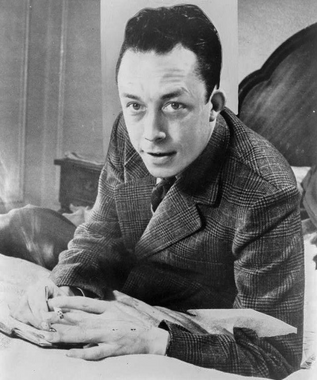Absurdism
What is absurdism?

Absurdism is a philosophical theory that the universe is irrational and meaninglessness. This belief rejects inherent meaning of the universe, and absurdists belief that life and the world they have been born into is absurd.
This theory was popularized by the philosopher Albert Camus, who produced numerous works about absurdism. Most prominently was the absurd novel The Stranger, which presents the protagonist Mersault as a man of the absurd. However, it is important to note that despite being absurd, Mersault is not meant to represent the absurd hero. For absurdists such as Camus, while Mersault is a man of the absurd, he is not meant ot be emulated. The book presents all events from Mersault's point of view as the protagonist, which allows readers to observe his negative traits. Specifically, Mersault uses the absurdity and meaninglessness of the universe as an excuse to be detached and indifferent torwards the world around him.
Camus presents an alternative absurd hero in the mythological figure of Sisyphus. In mythology, Sisyphus was condemned to push a rock up a hill for all eternity by the gods, but whenever he reaches close to the top, the rock will fall down the hill. Despite this, Sisyphus chooses to continue pushing the rock up the hill. Camus even remarks "one must imagine Sisyphus happy" to exemplify his status as an absurd hero: he lives in the ultimate absurd situation, being condemned to a meaningless task, similar to the absurdity of the universe. However, he still chooses to find fulfillment and happiness in this meaninglessness, traveling down the hill despite knowing he will never complete his task.
As a result, Sisyphus is a direct contrast to Mersault. Mersault constantly remarks that nothing really matters, and is indifferent to his life. This makes him uncaring torwards anything that happens, even his mothers death. For him to be an absurd hero and not just a man of the absurd, he has to change his outlook and try to find fulfillment and worth in the activities he is doing despite knowing they have no inherent meaning.
Connection to Papp Lore
In Papp lore, there are numerous men who could be considered men of the absurd. An important distinction to make is that very few of these are absurd heroes, and while these men exemplify absurd characteristics, they are not to be emulated.
Damien Williams
Damien Williams represents some absurd concepts. While he is on the way to becoming an absurd hero from a man of the absurd, he is not there yet. Damien endures pain and hardship in his life without complaints, showing his stocism and how he attended March 1sts which is similar to Sisyphus. In this example, he defies the absurdism of the universe and carves his own purpose by defining meaning in his own actions.
Damien also represents truthfulness and authenticity. Absurd men see no need to misrepresent their actions or make lies, and Damien is no different, as he lives and speaks authentically. This is similar to Camus' depiction of Mersault, who says the Czech man got what was coming to him because "you should never play games” (Camus 80) after he lied to his family and got killed.
However, he is not fully the absurd hero. In some aspects of his life, his absurdity makes him indifferent to the world around him, being especially indifferent torwards his future and life path.
PG
PG embodies the absurd hero and could be considered a modern day Sisyphus. Despite recognizing the absurdity and disorder of the universe, he finds meaning in the world and imposes his own moral compass upon his actions, as opposed to being indifferent to the events around him. This allows him to find purpose and fulfillment in his absurd life. He also represents true authenticity, as he remains steadfast in his beliefs despite outside pressures.
He also shows stoic qualities, working hard to improve himself and turn from the Empanada that Papp called him into a Sigma Genie, not complaing about his problems and instead finding fulfillment in the hardships of his life. This shows how he embodies the absurd hero that Camus describes.